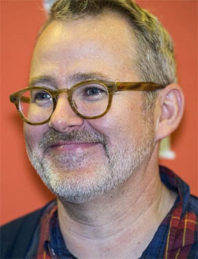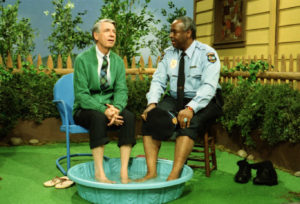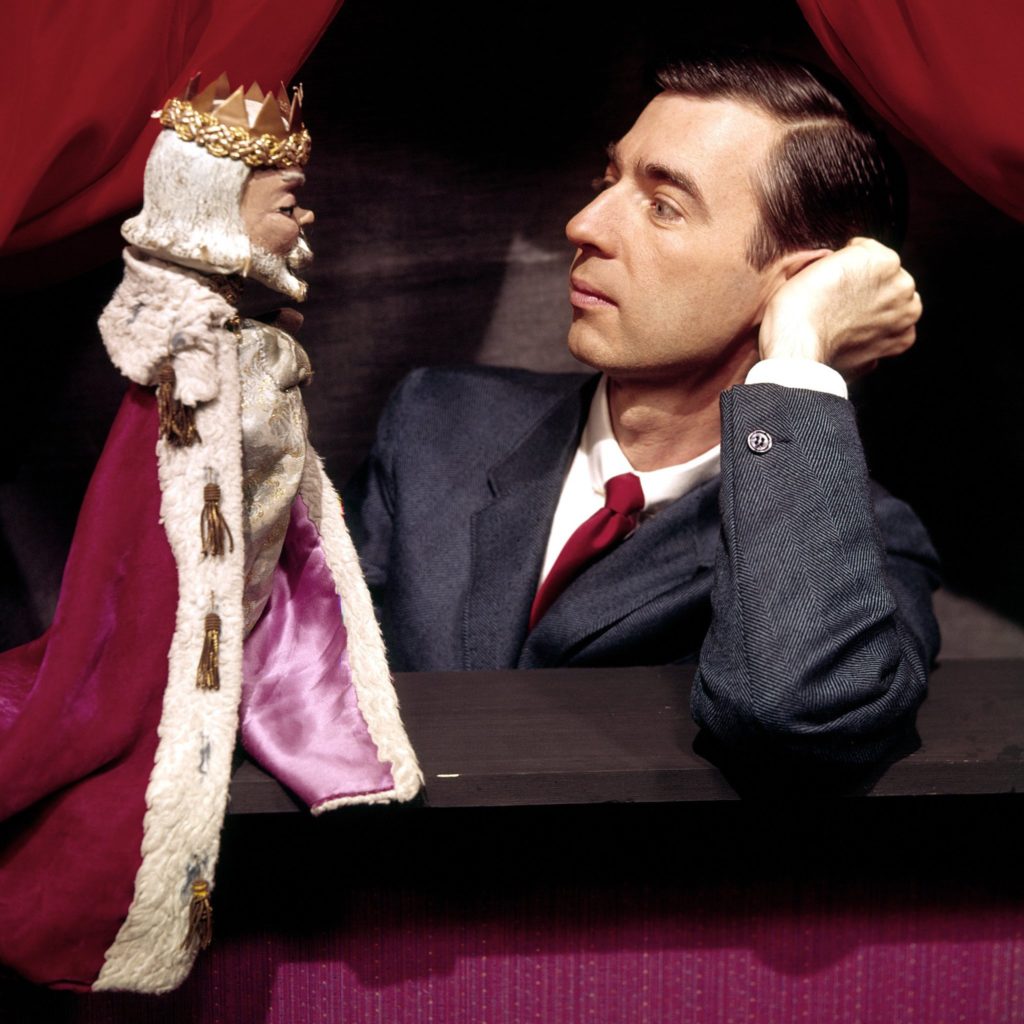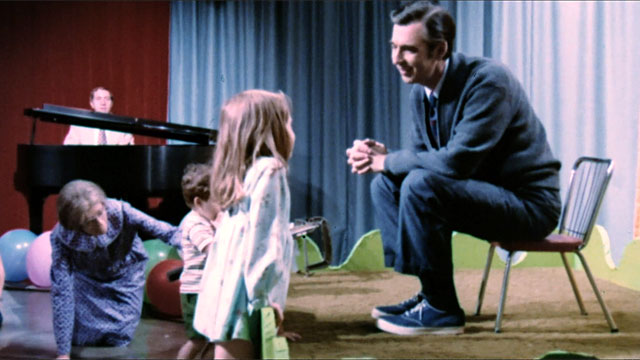
We live in such a divisive time, that when we get a slice of something that is genuinely nice and good in this world, we’re actually a little surprised by it…
Opening this Friday exclusively in Toronto before it rolls out nationwide; Won’t You Be My Neighbor is a documentary not only about the life and times of one Fred Rogers from the TV show ‘Mr. Rogers Neighborhood’. It not only examines his place in the grand scheme of pop culture but also asks if we’re living up to the standards that he set for us so many years ago.
During this past edition of the Hot Docs film festival here in Toronto, I got the unique pleasure to sit down with Director Morgan Neville to talk a little about not only the origins for him making the film but getting to examine the quite well meaning genius that was Fred Rogers on so many different levels.
Dave Voigt: Obviously congratulations on the film, but at the same time this really feels like one of those movies that you’re genuinely surprised hasn’t already been made. Walk me through the initial idea and spark to decide to make a film about Mr. Rogers.
Morgan Neviile: The funny thing is that it actually didn’t seem like an obvious film to make. It’s just one of those things because you know his videos go viral once in a while and I know a couple of people who knew him and they would tell me things about him from time to time that would genuinely surprise me. There were just a number of these little tidbits and nuggets of ideas that were floating around going “Maybe he isn’t exactly who I think he is?”.
Obviously, I loved him as a kid. I was born in 1967 so I really was the first generation of kids watching his show and then late one night I watched a bunch of YouTube videos of him giving commencement addresses and they were just striking me in this truly profound way, but I was still a little embarrassed by the idea and I kept tossing around if a serious filmmaker can make a serious film about a subject like Mr. Rogers because it almost sounds like a joke. Then I asked my wife it was a stupid idea to go and make a film about Mr. Rogers and she said ‘no way’. I spent a lot of time really testing the waters on this one with so many different people which led to me ultimately calling Nicholas Ma (son of Yo-Yo Ma) who is one of my producers, and he knows the family. I asked him, and he was onboard with the idea right away.
I really had a lot of hesitation because he really could be treated as this cardboard, milk toast figure in pop culture and making sure we did a film that has real dimension was important to me. And then once I started reading more about him and talking it out and finding out more and more about what kind of man he was lead to us going down to Pittsburgh and meeting everyone including Mrs. Rogers; who is such an incredible lady and the one thing she said to me that really stuck with me is “Don’t make Fred into a saint” which was just such great device because he was never the two dimensional person we all saw on TV but was very much a three dimensional human being. The difference Mr. Rogers and Fred is that he was the children’s version of a much more complex person, but it’s not a different person, it’s the same guy. Then we had to dive into this guys was a pacifist, spoke five languages but was also a very willful individual at the same time.
I think that’s what really struck me about the film is that on the surface his very existence seemed really minimalist in so many ways but when you peel back the layers of who he actually was, we see the depth and the nuance of what made him so unique, his very essence really because he was far from a simple kind of guy.
I have to reference the scene in the film that you pulled from the show where he’s washing his feet with a police officer to stay cool on a hot day, and that police officer happens to be black. While he’s certainly making a very powerful statement on race relations at the time, on the flip side of the coin the man playing the police officer was also gay, which you show was a very protected fact at the time.
Was it the big pull away for you from this film to show him as a man who not only this beloved children’s entertainer but also as someone incredibly pragmatic and conscience of the social and political climates around him?
He was a very pragmatic person and communicator because the thing is that the man himself actually grew up rich and very affluent, but also turned down more money than any of us could see in a life time, because he did no merchandising or anything like that at all. He always said that if he had tried to profit off of the show that it would pollute the relationship that he has with the viewer. It really comes down to the fact that in many ways his show was a ministry for children. It was non-denominational and even a non-religious ministry. While the show was certainly the most notable part of his ministry, everything that he did in his entire life was an extension of that.
From the moment Fred left his house every day, any child that he ran into in passing on the street he honored that relationship that he had with those kids on television in real life. That child believed that they had a one on one relationship with him since he would always address them personally so in many ways for him, television was almost a necessary evil of sorts for what he wanted to do. He hated television, he hated fame in many ways he was the Anti-TV Star! (Laughs)
And really that’s kind of where his genius in all of this lies as well because sure it was a ministry but it was one that really boiled down the ideologies of religion that so many grownups get hung up on and got it down to the core root of just being good to one another.
ABSOLUTELY, I mean even though he was a Presbyterian minister, he studied all religions. Essentially what he was trying to boil down was the parts of all religions that focused on basic humanistic values.
How do we treat each other? How do we think about ourselves? Basically he was trying to teach kids how to be human beings (laughs) and good neighbors in the community and especially for those kids who just may not have responsible parents, or any parents or even just ones being raised by the television which was really coming around in that day and age and making sure to let those kids know; You’re OK, We’re OK, Loving oneself and loving other people are OK.
It’s the fundamental tenants of how we should just be as people, and I think was resonates so strongly about that is that as we grow up we do tend to think less and less about those kinds of things. Instead we think about political party affiliation, or religious affiliation as we lose our emotional nakedness that you tend to have in childhood. Children to tend to be very direct about everything (Laughs) and I think that the directness that he had with kids is something we lose as we learn to put up different facades. Part of what had been really great about the film is that when you allow yourself to reconnect with someone who doesn’t put up those facades and just wants to be as direct and as honest with you as they can then it ends up being a very powerful experience.
And nobody ever does connect him to any kind of religion or political party, he is just quite literally that guy in our neighbourhood…
And our relationship with him really does predate any sort of sense of self in that sort of way. If you grew up with him in our culture he really does occupy a place that is unheard of, unless you’re Big Bird or Kermit The Frog. It doesn’t come out of the broader sense of pop culture but rather out of some of the earliest memories that we have. Plus he was also so very careful in his show to never have any kind of mentions of ‘god’ or to politicize something and I think that’s the whole thing about Francois (actor who played to black cop) because even though he was always very supportive of gay rights, he was also very aware of the need to defend and preserve the show for as many children as he possibly could. I mean while he was a pacifist and hated wars, he would never ever speak out against them either because he never wanted to alienate any of the kids who had parents who had been sent to war. For him it always came back to the kids. Even cast members would push him to make a social/political stand on issues on the show, but he never would.
Do you think that’s why this film is resonating so well with audiences now? We live in such a universe now where truly everything is politicized and is alienating towards different groups, but this film shows that it just DOESN’T have to be this way.
ABSOLUTELY, I mean that’s what it really seems like doesn’t it? It’s funny because another film of mine; Best of Enemies is almost about the exact opposite of what this one is. It’s a film that shows what happens when people figure out that they can make money by promoting conflict and divisiveness and it’s sad because conflict and hate are much more beneficial to the bottom line and making money then kindness, goodness and love has ever been; and that’s the trap that we are in. If everyone is incentivized to be divisive then who is ever going to speak up on behalf of kindness and civility? Other than Mr. Rogers; it’s really nobody and that’s kind of what I was responding to when I started to think about making the film. Trying to find that voice that we really aren’t hearing in our culture right now, because there really is no lobby out there for kindness…
And it’s been lost that just being kind to one another is just one of those unsaid things that people are supposed to do…
And really that’s what so many religions are supposed to be about, it’s supposed to be what I a lot of things are about but I really feel like religions have become deeply politicized which has become so incredibly corrosive.
To me the film is just about asking a lot of question about how we should treat each other and it’s nothing something I ever wanted to scold people with or to even provide any answers but just to look inside yourself and see if you’re living your life in the fashion that Mr. Rogers would have wanted you to.
Won’t You Be My Neighbour opens exclusively in Toronto tomorrow and expands to Montreal and Vancouver next week.


